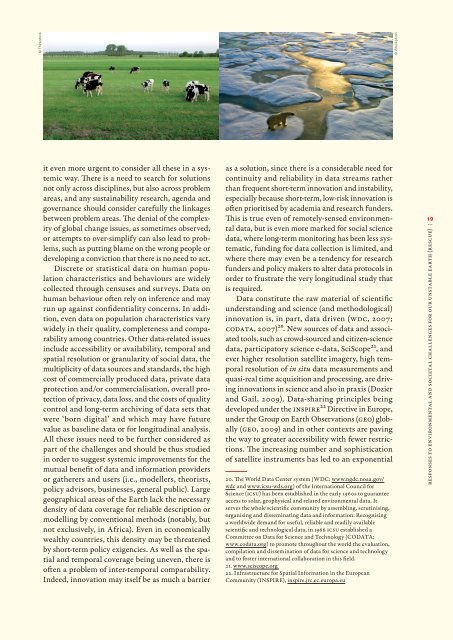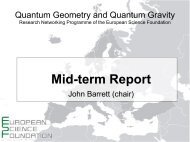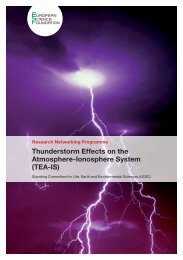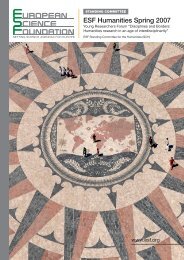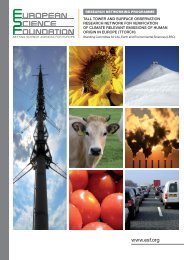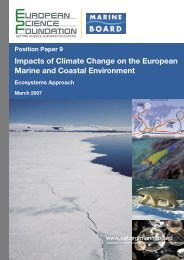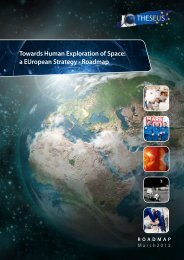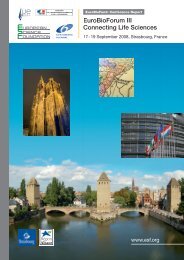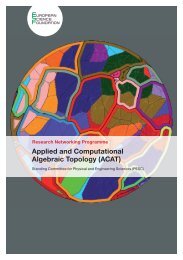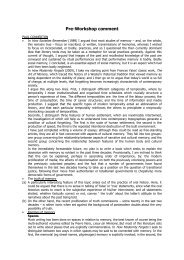Synthesis Report - European Science Foundation
Synthesis Report - European Science Foundation
Synthesis Report - European Science Foundation
Create successful ePaper yourself
Turn your PDF publications into a flip-book with our unique Google optimized e-Paper software.
© Thinkstock© iStockphotoit even more urgent to consider all these in a systemicway. There is a need to search for solutionsnot only across disciplines, but also across problemareas, and any sustainability research, agenda andgovernance should consider carefully the linkagesbetween problem areas. The denial of the complexityof global change issues, as sometimes observed,or attempts to over-simplify can also lead to problems,such as putting blame on the wrong people ordeveloping a conviction that there is no need to act.Discrete or statistical data on human populationcharacteristics and behaviours are widelycollected through censuses and surveys. Data onhuman behaviour often rely on inference and mayrun up against confidentiality concerns. In addition,even data on population characteristics varywidely in their quality, completeness and comparabilityamong countries. Other data-related issuesinclude accessibility or availability, temporal andspatial resolution or granularity of social data, themultiplicity of data sources and standards, the highcost of commercially produced data, private dataprotection and/or commercialisation, overall protectionof privacy, data loss, and the costs of qualitycontrol and long-term archiving of data sets thatwere ‘born digital’ and which may have futurevalue as baseline data or for longitudinal analysis.All these issues need to be further considered aspart of the challenges and should be thus studiedin order to suggest systemic improvements for themutual benefit of data and information providersor gatherers and users (i.e., modellers, theorists,policy advisors, businesses, general public). Largegeographical areas of the Earth lack the necessarydensity of data coverage for reliable description ormodelling by conventional methods (notably, butnot exclusively, in Africa). Even in economicallywealthy countries, this density may be threatenedby short-term policy exigencies. As well as the spatialand temporal coverage being uneven, there isoften a problem of inter-temporal comparability.Indeed, innovation may itself be as much a barrieras a solution, since there is a considerable need forcontinuity and reliability in data streams ratherthan frequent short-term innovation and instability,especially because short-term, low-risk innovation isoften prioritised by academia and research funders.This is true even of remotely-sensed environmentaldata, but is even more marked for social sciencedata, where long-term monitoring has been less systematic,funding for data collection is limited, andwhere there may even be a tendency for researchfunders and policy makers to alter data protocols inorder to frustrate the very longitudinal study thatis required.Data constitute the raw material of scientificunderstanding and science (and methodological)innovation is, in part, data driven (WDC, 2007;CODATA, 2007)20. New sources of data and associatedtools, such as crowd-sourced and citizen-sciencedata, participatory science e-data, SciScope21, andever higher resolution satellite imagery, high temporalresolution of in situ data measurements andquasi-real time acquisition and processing, are drivinginnovations in science and also in praxis (Dozierand Gail, 2009). Data-sharing principles beingdeveloped under the INSPIRE22 Directive in Europe,under the Group on Earth Observations (GEO) globally(GEO, 2009) and in other contexts are pavingthe way to greater accessibility with fewer restrictions.The increasing number and sophisticationof satellite instruments has led to an exponential20. The World Data Center system (WDC; www.ngdc.noaa.gov/wdc and www.icsu-wds.org) of the International Council for<strong>Science</strong> (ICSU) has been established in the early 1960s to guaranteeaccess to solar, geophysical and related environmental data. Itserves the whole scientific community by assembling, scrutinising,organising and disseminating data and information. Recognisinga worldwide demand for useful, reliable and readily availablescientific and technological data, in 1966 ICSU established aCommittee on Data for <strong>Science</strong> and Technology (CODATA;www.codata.org) to promote throughout the world the evaluation,compilation and dissemination of data for science and technologyand to foster international collaboration in this field.21. www.sciscope.org22. Infrastructure for Spatial Information in the <strong>European</strong>Community (INSPIRE), inspire.jrc.ec.europa.eu19Responses to Environmental and Societal Challenges for our Unstable Earth (RESCUE)


